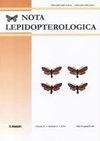Fruit-feeding in European cold season noctuid moths increases fecundity, but not longevity
IF 0.7
4区 农林科学
Q4 ENTOMOLOGY
引用次数: 1
Abstract
Feeding on rotting fruits, rather than nectar, is linked to high adult life-expectancy in certain butterflies, notably tropical Nymphalidae. We experimentally tested whether cold-season central European noctuid moths may also derive longevity and fecundity benefits from feeding on fruits. Many cold-season noctuid moths avidly feed on such resources. We expected fitness benefits to be especially pronounced in moths which overwinter as adults, in relation to their unusually long and thus nutrient-demanding imaginal life (6–9 months). Field-caught female individuals representing four genera (Allophyes Tams, 1942; Agrochola Hübner, 1821; Conistra Hübner, 1821; Eupsilia Hübner, 1821) were offered sucrose solution, sucrose solution enriched with vitamins, or moisturized banana slices plus sucrose solution, respectively, under greenhouse conditions. These moths represented two life-cycle types (autumn species vs. adult hibernators). Life span differed between moth genera, but we did not observe any enhancement of life span through fruit-feeding. Rather, in some cases moths kept with access to banana slices experienced a minor reduction in life span, compared to moths fed sucrose solution only. We observed no benefits in terms of enhanced fecundity through fruit-feeding in autumn species. Among adult hibernators, in contrast, potential fecundity increased by over 50% in banana-fed females, when observed over their full lifetime. Yet, if kept in the lab only after completing their hibernation in the wild, fitness benefits no longer accrued to moths from supplementing their diet with fruits. We conclude that noctuids that hibernate as adults are indeed income breeders which potentially increase their fecundity by feeding on fruits.欧洲寒冷季节夜蛾的水果摄食增加了繁殖力,但不能延长寿命
以腐烂的水果而不是花蜜为食,与某些蝴蝶的成年预期寿命高有关,尤其是热带睡蝶科。我们通过实验测试了寒冷季节中欧夜蛾以水果为食是否也能延长寿命和提高繁殖力。许多寒冷季节的夜蛾以这种资源为食。我们预计,与它们异常漫长、因此需要营养的想象寿命(6-9个月)有关,成年越冬的蛾类对健康的益处尤其明显。在温室条件下,分别向代表四个属的田间捕获的雌性个体(Allophyes Tams,1942;Agrochola Hübner,1821;Conistra Hü布尼er,1822;Eupsilia Hünner,1821)提供蔗糖溶液、富含维生素的蔗糖溶液或保湿香蕉片加蔗糖溶液。这些蛾类代表了两种生命周期类型(秋季物种与成年冬眠动物)。蛾属之间的寿命不同,但我们没有观察到通过果实喂养来延长寿命。相反,在某些情况下,与只喂食蔗糖溶液的蛾相比,能够接触香蕉片的蛾的寿命略有缩短。在秋季物种中,我们没有观察到通过果实喂养提高繁殖力的好处。相比之下,在成年冬眠动物中,香蕉喂养的雌性在其一生中观察到的潜在繁殖力增加了50%以上。然而,如果只有在野外完成冬眠后才将其放在实验室中,蛾类就不会因为补充水果而获得健康益处。我们得出的结论是,成年后冬眠的夜蛾确实是收入饲养者,它们可能通过吃水果来增加繁殖力。
本文章由计算机程序翻译,如有差异,请以英文原文为准。
求助全文
约1分钟内获得全文
求助全文
来源期刊

Nota Lepidopterologica
Agricultural and Biological Sciences-Insect Science
CiteScore
1.70
自引率
14.30%
发文量
20
审稿时长
14 weeks
期刊介绍:
Nota Lepidopterologica is the scientific, peer-reviewed journal of the Societas Europaea Lepidopterologica (SEL). It publishes original contributions to the study of mainly but not exclusively Palaearctic Lepidoptera, especially on taxonomy, morphology/anatomy, phylogenetics, biogeography, ecology, behaviour, and conservation, but also on any other aspects of lepidopterology.
All articles are published in English, with the possibility of having the summary written in other languages. All submitted manuscripts are subject to peer-review by the leading specialists for the respective topic. The journal is published in open access high-resolution PDF, semantically enriched HTML and machine-readable XML versions.
All papers can be freely copied, downloaded, printed and distributed at no charge. Authors and readers are thus encouraged to post the pdf files of published papers on homepages or elsewhere to expedite distribution. Publication is free for the SEL members and there is no charge for color.
 求助内容:
求助内容: 应助结果提醒方式:
应助结果提醒方式:


